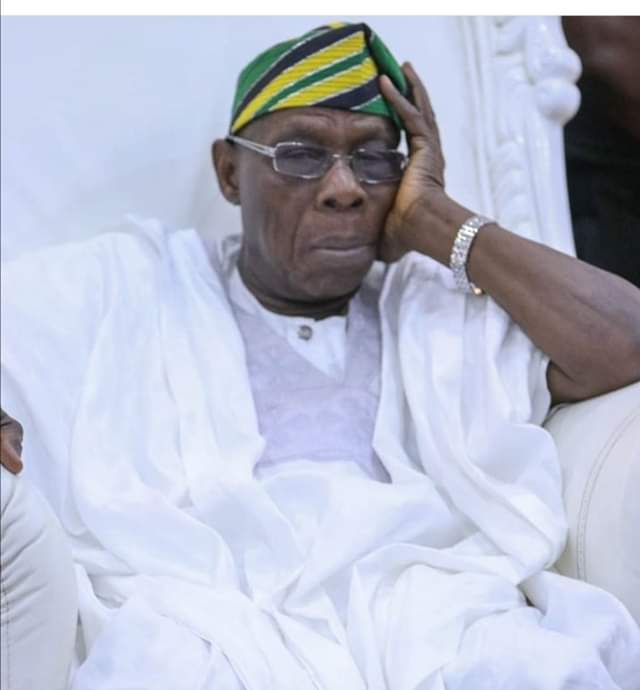
THIS year is remarkable for special political repentance for the combative General. Perhaps, not every soldier will be warrior for all seasons. The twilight of life is good for winding down, following a careful introspection and reassessment of a long life of great exploits and avoidable errors.
Olusegun Obasanjo, former military Head of State and one-time President of Nigeria, has finally seen the light. The civil war hero had fought to keep the country together. He also had the opportunity of ruling the “artificially united” country by force between 1976 and 1979 and by democratic consent between 1999 and 2007. Then,many observers said he behaved like a lord of manor, oblivious of an inevitable end to political authority.
During his years in power, he had the opportunity to resolve the lingering national question, which he deliberately avoided like poison. He posed as a nationalist, claiming that Nigeria was his priority as if the country is not erected on the pillars of over 250 ethnically divided social formations.
Thirteen years after leaving Aso Villa, the seat of government, reality has dawned on him that he had bungled the rare opportunity to make a greater history beyond his command of the Third Marine Commando and being the longest ruler Nigeria ever had.
At a recent memorial lecture for Dr. Frederick Fadehun, who the Federal Government arested and detained for leading the Oodua Peoples Congress (OPC), the Ekerin Egba and Balogun Owu regressed into a curious defense mechanism. The former leader called for restructuring. Many were taken aback since he had inadvertently positioned himself as an obstacle to the reconfiguring of the fledgling federation. Obasanjo, the newest political missioner, was however, silent of the elements of restructuring he would like to prescribe to make the federal arrangement workable. To many commentators, it was the height of hypocrisy.
The Ebora Owu also called for a Constituent Assembly to make a new constitution for Nigeria. While in the saddle, he failed to take a step in that right direction. But, it appears that he has amended his 2004 view on the supremacy or sovereignty of the parliament over a possible Peoples’ Conference, a development that gave rise to protests by pro-democracy activists who initiated PRONACO.
Obasanjo, a product of centralised military hegemony, could not shed light on the elements of restructuring that will herald “true” federalism-state and community police, abolition of Land Use Act, devolution, status of councils, etc.
Is Obasanjo just merely threading on the populist path? Is he warming himself to the pro-devolution forces by pontificating on the envisaged new order on the borrowed platform of restructuring? Why did he fail to properly champion constitutional reforms when he was in Aso Villa? Is he now convinced that the divided house is threatening to fall?
Can Nigerians take the emergency advocate of restructuring serious?
Many believed that Obasanjo was carried away by the euphoria of his second coming. He was overwhelmed by privilege and power, which is permanently transient. May be, the experienced soldier lacked a picture and idea of where he should take Nigeria to in the next eight years. His projections were faulty, for he hardly knew that the bewildered country had not become a nation and only a great leader can embark on fundamental programmes that could make it a nation-state in an atmosphere of unity in diversity. The tools of nation building are never associated with pseudo-military tactics of force and compulsion in a civilian dispensation, which he seemed to have epitomised at the beginning of this Fourth Republic .
Yet, there was a ray of hope in 2004, when Obasanjo set up the Abuja National Conference to debate the future of the country. It was because he knew that something was wrong with Nigeria. Having checkmated potential coup plotters in the Armed Forces to protect his regime and enhance political stability, he turned to the bigger issue of constitution review. Although the intra-party committee on review, which he initially set up, ended in fiasco, hope was rekindled when the Abuja confab was inaugurated.
However, it was not a Sovereign National Conference. Signs that the national meeting would not be insulated from manipulation were visible as the Commander-In-Chief stipulated some “no-go” areas. Obasanjo looked at Nigeria from the prism of his illustrious military career, saying that the unity of Nigeria was non-negotiable. He had the support of many who loathed disintegration. But, the national unity he flaunted was non-existent. It was a figment of hyperactive imagination.
The national conference only achieved an objective. During its one-year duration, national attention was focused on the conference and activities of the paid delegates. Also, there was peace throughout the country. Even, Niger Delta agitators sheathed their swords. Many stakeholders believed the conference will paved the way for bold and highly rewarding constitutional reforms.
However, the report of the conference was destined for the dustbin. It was sacrificed on the altar of third term. The baby was thrown away with the bath water. The efforts were in vain.
Following the collapse of the third term agenda, the report of the conference was never dusted. Obasanjo accorded priority to succession politics instead of striving for a legacy of constitutional change.
In later years, he lamented outside power that a certain region was plotting what he termed “fulanisation” and “islamisation” of Nigeria to subjugate other tribes. People like Major-General Olufemi Olutoye, whose advise he ignored in 1976, would have been laughing at his sudden wake up from a deep slumber.
What were the contributions of OBJ to the growth of federalism? Which great example did he lay in this regard? Rather, his regime attempted to deepen unitarism. The former leader positioned the beleaguered country very far from the practice of the federal principle.
Why did the leaders of the pan-Yoruba socio-political organisation, Afenifere, support his second term bid in 2003? Was their decision a demonstration of love for the son of soil? Was it not because Obasanjo promised to restructure the country? After his victory, did he honour the agreement in any way?
At the heart of the struggle for federalism is resource control. But, what was the experience of one of its its leading champions, former Governor Victor Attah, in the days of Obasanjo?
Today, power outage is the vogue. Yet, almost 18 years ago, former Governor Bola Tinubu of Lagos State initiated the Independent Power Project (IPP). Was the project not frustrated by the power-loaded President Obasanjo?
Also, what was his reaction to the creation of new councils by some governors, in accordance with popular yearnings? Obasanjo maintained that only the 776 local governments listed in the constitution would be recognised, adding that the newly created councils were a nullity.
Obasanjo unjustifiably punished Lagos State for lawfuly creating additional 37 councils by withholding allocations to the pre-existing 20 local governments for 14 months. It was agonising for the state and local governments. The state would have collapsed, but for the creative financial engineering of the Tinubu administration.
By Emmanuel Oladesu













